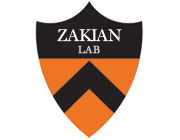Formation and stability of linear plasmids in a recombination deficient strain of yeast.
Publication Year
1985
Type
Journal Article
Abstract
Natural termini from macronuclear DNA of the ciliated protozoans Tetrahymena thermophila and Oxytricha fallax can support telomere formation yeast. However, plasmids carrying these ciliate termini are modified by the addition of DNA which hybridizes to the synthetic oligonucleotide poly [d(C-A]), a sequence which also hybridizes to terminal restriction fragments from yeast chromosomes but not to Tetrahymena or Oxytricha macronuclear DNAs. Thus, in yeast, the creation of new telomeres on ciliate termini involves the acquisition of yeast-specific terminal sequences presumably by either recombination or non-templated DNA synthesis. The RAD52 gene is required for the majority of yeast mitotic and meiotic recombination events. Moreover, the absence of an active RAD52 gene product results in high rates of chromosome loss. Here we demonstrate that terminal restriction fragments from Tetrahymena macronuclear ribosomal DNA (rDNA) support the formation of modified telomeres in a yeast strain carrying a defect in the RAD52 gene. Moreover, linear plasmids bearing these modified ciliate termini are stably propagated in rad52- cells.
Keywords
Journal
Curr Genet
Volume
9
Issue
6
Pages
441-5
ISSN Number
0172-8083
Alternate Journal
Curr. Genet.
PMID
3916729

